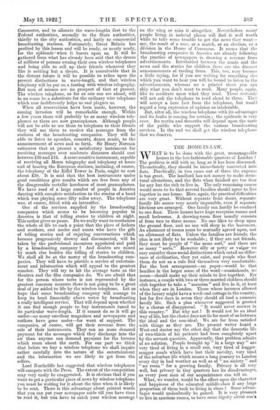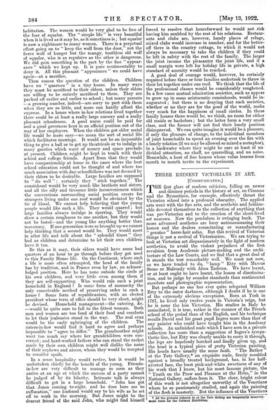TILE HOME-IN-LAW.
WHAT is to be done with the great, unmanageable houses in the less fashionable quarters of London ? The problem is still with us, long as it has been discussed. Theoretically, they should be immediately converted into fiats. Practically, in two cases out of three the expense is too great. The landlord has not money to make struc- tural alterations, and the flats when finished are too dear for any but the rich to live in. The only remaining course would seem to be that several families should agree to live together in one house. Here, again, the practical difficulties are very great. Without separate front doors, separate family life seems very nearly impossible, even if separate kitchens are arranged. One family can hardly be confined to one floor. These houses have huge reception rooms and small bedrooms. A drawing-room floor usually consists of from two to three rooms. No one likes to sleep upon the ground floor, and no one will sleep in the basement. An allotment of rooms must be mutually agreed upon, not an allotment of flats. Unless the families are friends, the plan is not likely to be workable ; if they are not friends, they must be people of " the same sort," and there are so many " sorts." However silly or petty or vulgar we may consider those social distinctions which entail no differ- ence of civilization, they yet exist, and people who flout them do not as a rule find themselves very comfortable. Far the best arrangement—on paper—would be that families in the larger sense of the word—cousinhoods, we mean—should make up their minds to live together. For instance, a couple with two or three married children should club together to take a " mansion " and live in it, at least when they are in London. Those whose incomes allowed of the luxury might have a week-end cottage in the country, but for five days in seven they should all lead a common family life. Such a plan whenever suggested is greeted by a chorus of disapproval. " It would never answer in this country." But why not ? It would not be an ideal way of life, but the choice does not lie for most of us between the ideal and the non-ideal. We are far from satisfied with things as they are. The present writer heard a West-end doctor say the other day that the domestic life of two-thirds of his patients had been completely upset by the servant question. Apparently, that problem admits of no solution. People brought up in a large way " are very tired of living in a small one, very tired of hugger- mugger meals which have lost their novelty, very tired of the suburban life which means a long journey to London every day in bad weather as well as of no society " and " no room " for a growing family. Privacy is all very well, but privacy in tiny quarters has its disadvantages, as every poor- man of our acquaintance can tell us. What, we wonder, would be the effect upon the character and happiness of the educated middle-class if any large proportion of them took to living in clans ? Some advan- tages would undoubtedly be gained. It is very pleasant to live in spacious rooms, to have some dignity about one's habitation. The women would be very glad to be free of the fear of squalor. The " simple life " is very beautiful when it is lived as it may be, as it sometimes is ; but squalor is now a nightmare to many women. There is a perpetual effort going on to " keep the wolf from the door," not the fierce wolf of hunger but the mangy, toothless old wolf of squalor, who is as repulsive as the other is dangerous. We did gain something in the past by the fine " appear- ance " which we kept up. It is pure sentimentality to deny it. All this pleasant " appearance " we could have again—at a sacrifice. Then comes the question of the children. Children have no " quarters in a tiny house. In many ways they must be sacrificed to their elders, unless their elders are willing to be entirely sacrificed to them. They are packed off earlier and earlier to school ; but many parents —a growing number, indeed—are sorry to part with them when they are so little, and more can hardly afford the expense. In a house where in-law relations lived together there could be at least a really large nursery and a really pleasant schoolroom. A good nurse could be paid for and a good governess kept in an official position out of the way of her employers. When the children got older social life would be more easy—we mean the sort of social life which facilitates marriage. It would not be an impossible thing to give a ball or to get up theatricals or to indulge in many gaieties which want of money and space preclude at present. Children might be kept in touch with their school and college friends. Apart from that they would have companionship at home in the cases where the best school education could not be thought of and where too much association with day-schoolfellows was not deemed by their elders to be desirable. Large families are supposed to " do well " : certainly they stick together." The cousinhood would be very much like brothers and sisters, and all the silly and tiresome little inconveniences which the conventions surrounding social position create for strangers living under one roof would be obviated by the tie of blood. We cannot help believing that the young people would like such a life. They would quarrel ; but large families always indulge in sparring. They would show a certain roughness to one another, but they would not be bored—and the young like anything better than monotony. If one generation were so brought up we cannot help thinking that a second would be. They would meet in after life and talk about the " splendid times " they had as children and determine to let their own children have it too.
Be this as it may, their elders would have some bad quarters of an hour to go through before they got used to this Family House life. On the Continent, where such a life is more often attempted, the head of the family has by tradition, and in France even by law, an acknow- ledged position. Here he has none outside the circle of his own children, and very little even among them if they are self-supporting. Who would rule such a joint household in England ? Is some form of monarchy the only conceivable method of preserving order in such a house ? Some form of republicanism, with an elected president whose term of office should be very short, might be devised. Household management—the catering, &c. —would be quite sure to fall to the fittest woman. Both men and women are too fond of their food and comforts to let their "jealousies stand in the way. The real crux would be the early upbringing of the children. The sisters-in-law would find it hard to agree and perhaps impossible to " agree to differ." The grandmother might want too much say where her grandchildren were con- cerned ; and hard-worked fathers who can stand the racket made by their own children might well dislike the noise of their nephews and nieces, whom they would be tempted to consider spoilt.
In a sense hospitality would revive, but it would be undertaken chiefly for the benefit of the young. Friends- in-law are very difficult to manage so soon as they arrive at an age at which the success of a party cannot be judged of by its hilarity. Intimate. talk is always difficult to get in a large household. " John has got that Jones coming to-night, and he does bore me to suffocation," one husband would say to his wife as he set off to work in the morning. But Jones might be the dearest friend of the said John, who might find himself forced to resolve that henceforward he would not risk having him snubbed by the rest of his relations. Restaur- ants and clubs are, however, handy places of refuge, mixed clubs would increase in number, and for the better- off there is the country cottage, to which it would not always be necessary to take the children if they could be left in safety with the rest of the family. The larger the joint income the pleasanter the joint life, and if a small margin were left for holiday life in private, a high standard of amenity would be reached.
A good deal of courage would, however, be certainly required before three or four families undertook to throw in their lot together under one roof. We think that the life of the professional classes would be considerably roughened. In a few cases mutual admiration societies, such as appear to grow up in some aristocratic cousinhoods, would be in- augurated ; but there is no denying that such societies, whether or no they are for the good of the world, make very much for the happiness of small circles. In these family houses there would be, we think, no room for either old maids or bachelors ; but the latter form a very small class, and the former will not find their lonely position disimproved. -We can quite imagine it would be a pleasure, if only the pleasure of change, to the individual members of joint households to spend an evening over the fire with a lonely relation (if we may be allowed so mixed a metaphor), in a backwater where they might be sure at least of un- divided attention, no chaff, no quarrelling, and no noise. Meanwhile, a host of fine houses whose value lessens from month to month invite to the experiment.



































 Previous page
Previous page